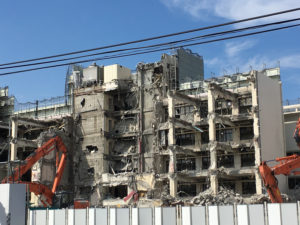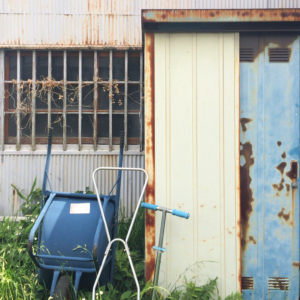Irresistible ?
I receive a number of inquiries about very affordable and yet old condominiums from foreign nationals.
They don’t know much about Japanese market.
Japan is facing serious social issues including ageing society and shrinking population.
And old condominiums are facing similar realities especially in the regional areas.
I am not saying all old condominiums are risky but please do not jump at the gun only because they are cheap.
You need to carefully investigate the property and check the potential risks.
Real estates are totally controlled by the market mechanism and they are cheap for a reason.
That said, if you carefully search, you could get a relatively good investment.
In some cases, the problem of management of apartment is heavily burdened on the residents.
During the economic booming era , a large number of condominiums were supplied
to the market since the 70s.
It has been seen with enthusiasm in the past, but now it is becoming more and more elderly people living in decreasing numbers, lonely death, inheritance abandonment, over-due management fee/repair reserve fund.
Those expose various serious problems.
In the foreclosures and real estate execution sites, execution by condominium management fee delinquency occurs regularly,
and these delinquent money will be borne by the association of owners.
*
In Japan, owners of the units are legally required to set up the association to run and manage the property (condominium) and usually the association outsource the daily work to the condominium management company.
This kind of problems do not occur in the modern condos in central Tokyo but it could happen more in the local regions
where the ageing is more apparent.
In these days, quite a few condominiums in local regions are put up for sale at 10,000 yen (I repeat 10,000 yen),
which is the lower limit of the auction bidding starting price.
Originally apartment buildings such as condominiums should have the benefit of the land of “highly convenient location”
but it is a land pattern that does not make you feel such an idea at all during the bubble period construction.
I have recently read on report about a dying condominium in a regional area.
Here is the story about a gentleman who is working as a trustee of foreclosure properties.
It seems that there was a railway extension plan to the vicinity of the property at the architectural planning stage,
and there was an oral advertisement such as “the price could jump if the station is ready”,
but the railway extension plan becomes a trap at the same time as the bubble collapse. … at the end of the sequel to be stigmatized as a spot of suicide ….
Hard reality 1: Management company changes very often
In the case of the foreclosure execution to the apartment complex (foreclosure execution) including the condominium,
there is an interaction with a person(janitor) hired buy the management company.
In these days, those janitors do not know the process of the foreclosure because the management
“In fact, the management company has changed, I am new. “It is the first time for me o do such a job”
There is also an increasing number of cases where the board of directors led by owners association
through special resolutions, changes the management companies. They change the management company to save the cost of the fee.
A lot of owners association of old condominiums are under the pressure to save the property financially. If the association
goes bankruptcy, the property will lose the substantial value due to the lack of maintenance.
There are only few examples of successful self-management. As I said many associations hire the outside management company but some
are trying to manage the property by themselves called ‘self management’.
Hard reality 2 : But “self management” is very hard.
Instead of having a management company, they are residents who manage themselves.
There is also an advantage that the management cost and the repair reserve will be significantly cheaper,
but in the end the management becomes to difficult to sustain.
I have never encountered a property which is well managed by themselves.
As for “management” of apartment buildings and other housing complexes, the “Board of Directors”, which is a representative the owners association
is also standing at a crossroads.
Generally speaking, participation in the board of directors is fair, and all residents will be in charge of the officers in a rotating system.
But some irresponsible owners (especially owners are residing abroad) refuse to take turns.
Hard reality 3 : The auction market is becoming messy.
Until now, apartments in the metropolitan area were easy to enter broker’s tags among auction properties as “easy to sell”.
As the troubled condominiums are increasing, the broker narrowed down the bidding criteria significantly, the bidding situation to the apartment auction property with unreliable location, age, and management system has fallen sharply .
There is an impression that the movement that actually captures the “problems of the condominium complex”
has finally spread to the market.
Final Thought
I am not trying to demonize the condominium investment but whenever you find a very cheap property,
(especially in a remote area) you need to think twice. It is essential to investigate the management status of the property before you
purchase. You will be automatically a member of the management team and as far as you own it,
you will be on the same boat. They are always cheap for a reason.
Even if you can not exit your investment for a reason, you will have to pay
the property tax, management fee and the repair funds payment.
Other Helpful Articles
Where is the most expensive location in Tokyo ?:Latest PER report by Tokyo kantei
Is it a good investment ? Due Diligence For high-rise condominium buyers : What You Need to Check
The best buy places to own a new condo unit in Japan
Toshihiko Yamamoto
Real estate investing consultant and author.
Founder of Yamamoto Property Advisory in Tokyo.
International property Investment consultant and licensed
real estate broker (Japan).
He serves the foreign companies and individuals to buy and sell
the real estates in Japan as well as own homes.
He holds a Bachelor’s degree in Economics from
Osaka Prefecture University in Japan
and an MBA from Bond University in Australia
Toshihiko’s book, “The Savvy Foreign Investor’s Guide to Japanese Properties: How to Expertly Buy, Manage and Sell Real Estate in Japan”is now out on Amazon, iBooks (iTunes, Apple) and Google Play.
About the book
Amazon.com Link




